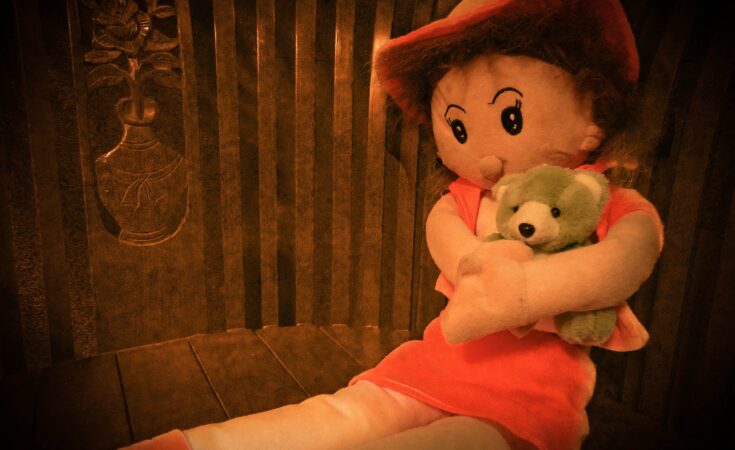It is said that between 3 and 5 years old, children may bring to life a friend straight out of their unplanned imagination… This phenomenon is completely normal and affects up to two out of three children. Many therapists consider the appearance of such a friend as a proof of imagination, creativity, sensitivity, artistry… Yes, maybe, but… This situation can cover other disorders. In particular emotional, psychic or energetic disorders… Let’s talk about it!
An imaginary companion or friend is “an invisible character, named and evoked in conversation with other people or with whom one plays directly for a period of time, at least several months, having an air of reality for the child but without apparent objective basis” (Svendsen, 1934).
The imaginary friend can be of several kinds. Either he remains in the mind like an imaginary big brother to whom the child will sometimes refer. Either he really comes to life in the mind of the child who will not only think of him but will experience games and positive or negative situations with him. Either it is symbolized by a doll, a teddy bear or another item that seems alive.
None of my children have been confronted with an imaginary friend, but I see children, at my sophrology office, who explain me they have one.
How does this imaginary friend appear?
If he remains in the mind of the child, the child will give him a character, a style… and will include him in his daily life. He may tell that he went to the swimming pool with his imaginary friend for example. Sometimes he gives him a name. It can be a classic name or a totally wacky one.
If it’s a cuddly toy that comes to life in his mind then the child can directly tell what he says or make sentences to him BUT it is important to remember that it is not like a child who would act as a puppeteer. To him the imaginary friend is absolutely alive!
There is another theory about the imaginary friend, the one related to energies. Many civilizations consider the Earth to be populated by good and bad energies and entities. Think of Japan and the Yokai for example! Negative entities and pranksters arrive when someone is in distress or seeks a subtle world through imagination.
On the web abound examples of children who have not managed to detach themselves from their imaginary friends. Some explain that these friends have become entities, easily visible to mediums and other therapists working in the magnetism field. These entities unhealthy with others behave protectively with them. They are like “their” children. On the french Femina forum, a girl called Elisa explains she has had an entity with her since she was 9 years old. She is now 19. Psychologists and psychics notice that fact without being able to separate her from “him”. What if our sheer would create imaginary beings like egregores and only we could end them as creator-destroyers? This is one point of view among many others…
In my office I have noticed some children, following a big fright (watching a film not suitable for their age, trauma at school, etc.) invent a negative imaginary friend with whom to “deal” the situation they go through. Fans of energy and the subtle worlds would tell you that thinking is a creative tool. According to them, it would be quite possible to attract entities from the lower astral to oneself when one “makes” a being with one’s spirit. This can cause energetic disturbances in our world and in the subtle world around us. Disturbance is a state of mind which always calls and attracts entities (or amounts of negative energies, call them the way you want).
Anyway if the child no longer wants his imaginary friend to live (this is sometimes seen), it is good to teach him how to manage his thoughts by small simple exercises but also to protect his mind from parasitic thoughts or mere influence of negative or toxic people. This work can be undertaken quite early since the child understands comparisons. Cards that name the stages of the situation he is going through, but also his emotions, may help the therapist understand what is at stake in the problem.
If your child’s imaginary friend doesn’t bother you more than that, know that he will leave when the child turns 8 at the latest.
Why did your child create an imaginary friend?
- By loneliness
- To fill an emotional lack
- Out of boredom
- Out of interest in hidden and secret things
- To push his own limits
- To adapt to a new or transitional situation
If your child tells you about his imaginary friend ask him questions about that weird being. You will discover a lot about your child’s inner world, his desires, what he may have repressed deep inside of him…
Never make fun of him but give him your seriousness.
Don’t talk to your child’s imaginary friend and keep the situation normalized and framed. Do not give too much importance to this imaginary friend. Many troubles grow when you feed them! Remember that!
Sometimes the imaginary friend appears in a stressful situation as if to reassure the child. It is then good to talk about this point of stress and to understand it.
If the child isolates himself and no longer plays with others, he must be reminded that the material world must not be forgotten. He has the right to have an imaginary friend, but it is the law of life to communicate with others and to interact with real children.


































